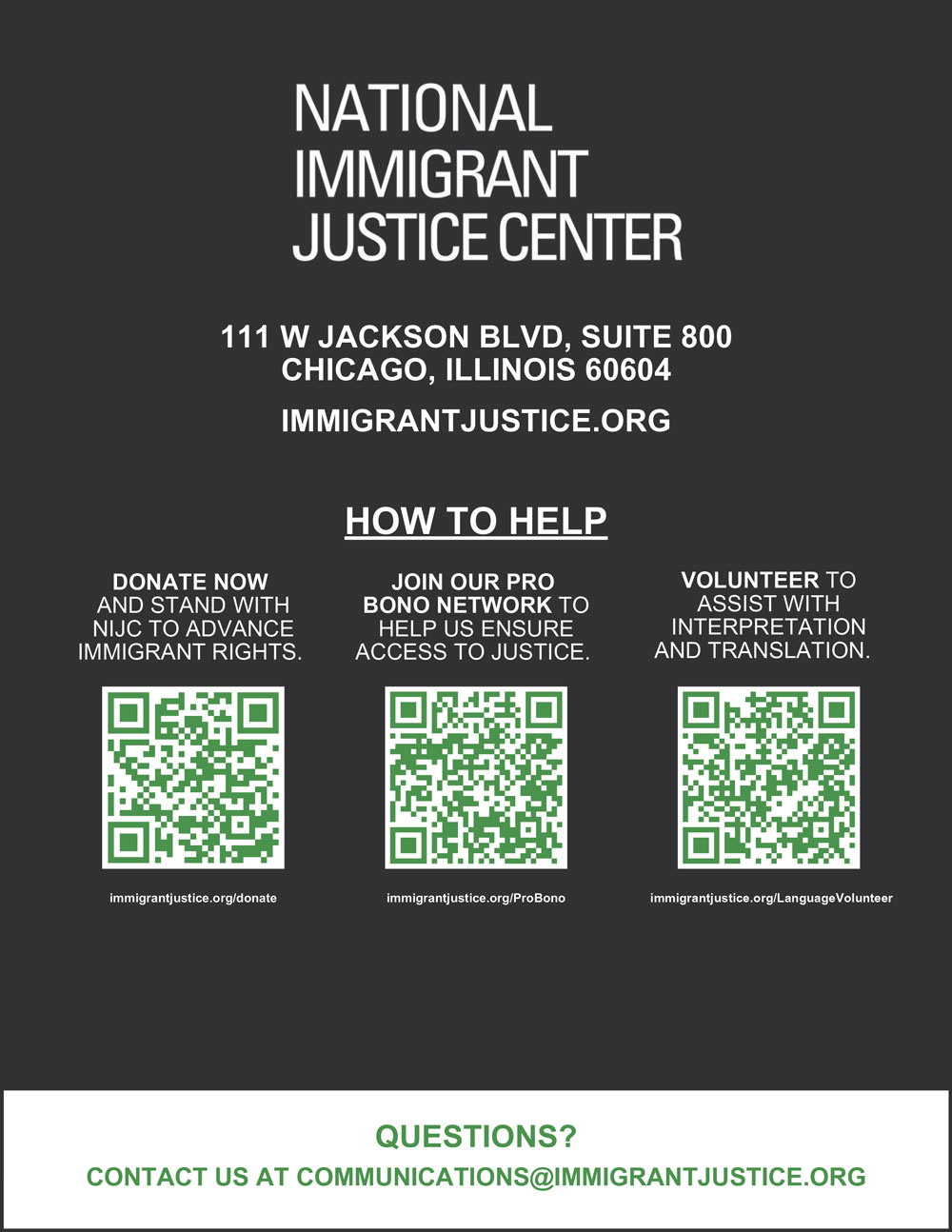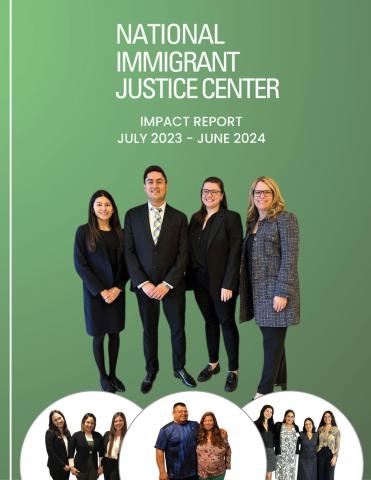From the Desk of NIJC Executive Director Mary Meg McCarthy
Dear Friends:
Forty years ago, a small group of attorneys founded what is now the National Immigrant Justice Center (NIJC) to provide legal representation to Haitians and Central Americans fleeing violence and persecution. Our goals were to ensure that they were recognized as individuals with inherent rights and dignity and to uphold the rule of law, irrespective of politics.
Since then, NIJC has expanded from our humble beginnings — serving about 82 people in our first year through a mostly volunteer network of 60 attorneys — to a nationally recognized organization with a staff of more than 160 professionals and network of 2,000-plus pro bono volunteers that advocate for thousands.
Today, the need for NIJC’s life-saving legal services and zealous human rights advocacy is greater than ever. In May 2024, more than 120 million people were displaced by violence, the highest ever recorded (UNHCR, 2024).
Our mission and values have not changed. We continue to defend the rights and dignity of immigrants, asylum seekers, and refugees and fight for justice in a deeply flawed system. This past year, we provided legal services to more than 11,000 individuals and families. We helped more than 2,400 people secure legal relief and employment authorization, defending their rights under the law and allowing them to live in safety with their families in the United States. We achieved multiple victories in the federal courts and in Washington, D.C., including securing remedies for separated families and advocating for the return of unjustly deported individuals.
NIJC also celebrated a major milestone this year, becoming an independent nonprofit organization in April 2024. This new chapter will help ensure our long-term sustainability and ability to achieve our mission. Thanks to the support of our community, NIJC navigated this transition without any reductions in our programs or services.
As we enter a pivotal year, NIJC moves forward with hope, perseverance, and a renewed commitment to our mission. The politicization of immigration has created a challenging landscape, yet NIJC will continue to advocate for justice through our unique, multi-faceted approach of legal services, impact litigation, advocacy, and public education.
Thank you for standing with us and the communities that we serve at the vanguard of the fight for justice. With your support, we are confident that we can achieve another 40 years of impact and build a future that upholds human rights and dignity.
With Gratitude,
Mary Meg McCarthy
NIJC's Mission
To establish and defend the legal rights of immigrants regardless of background and transform the immigration system to one that affords equal opportunity for all.
NIJC's Unique Model
NIJC’s multi-pronged model combines four strategies to ensure access to justice for immigrants and their families, while fighting to transform the immigration system into one that upholds justice and human rights.
- Direct legal services: Legal information, comprehensive legal screenings, legal representation, and application filing
- Impact litigation: Litigation in the federal courts to challenge policies and practices that violate human rights
- Policy advocacy: Advocacy at national, state, and local levels and in partnership with coalitions for immigration policies that advance human rights
- Strategic communications: Public education through research, reports, presentations, and media
Legal Service Practice Areas
NIJC has the depth and breadth of expertise to provide high-quality legal services in a comprehensive range of matters, including:
- Asylum
- Removal defense
- Adjustment of status for asylees and refugees to obtain lawful permanent residence
- Naturalization
- Deferred Action for Childhood Arrivals (DACA)
- Temporary Protected Status (TPS)
- Legal status for survivors of crime, trafficking, and domestic violence (U visa, T visa, VAWA)
- Special Immigrant Juvenile Status (SIJS) for children who have been abused, neglected, or abandoned
- Family petitions
- Bond hearings for detained immigrants
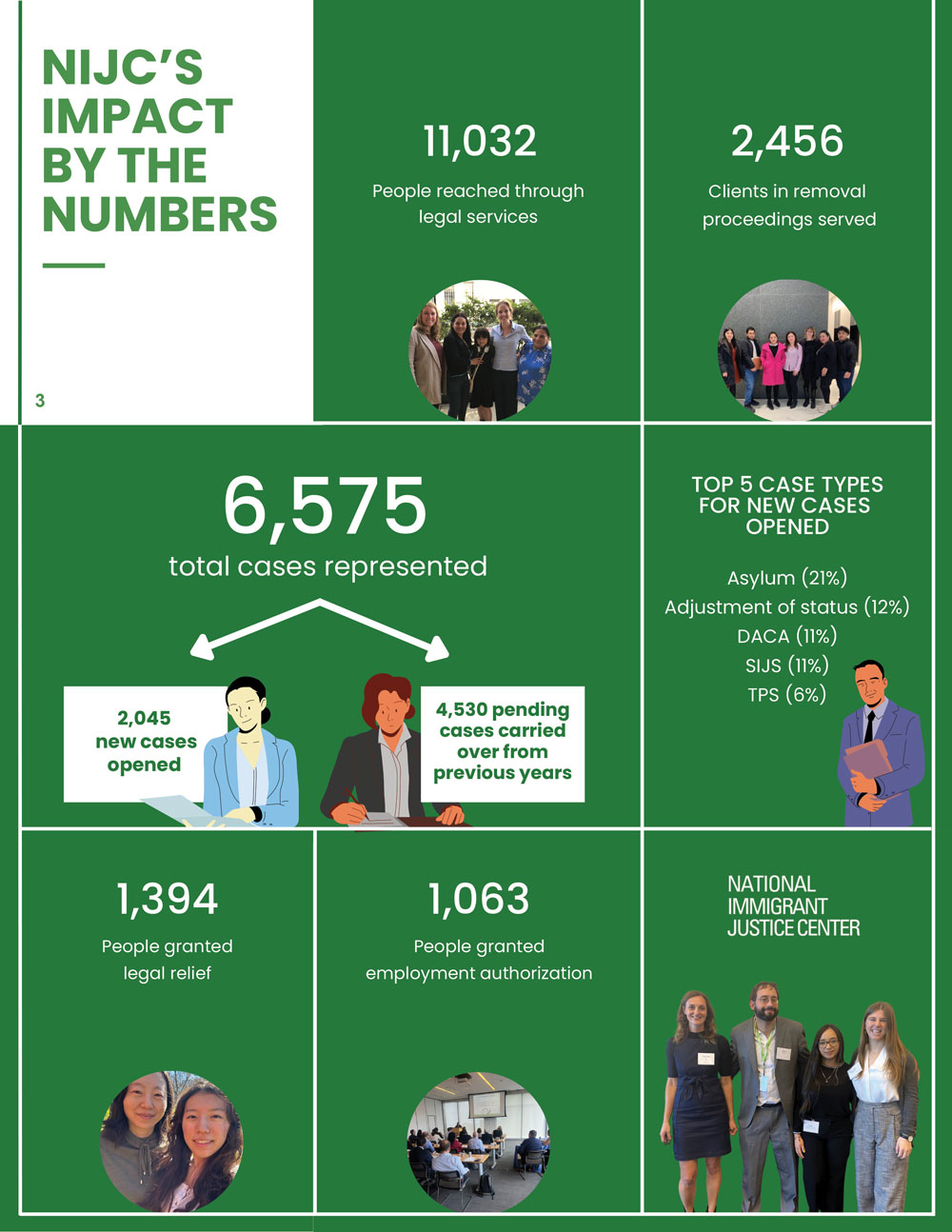
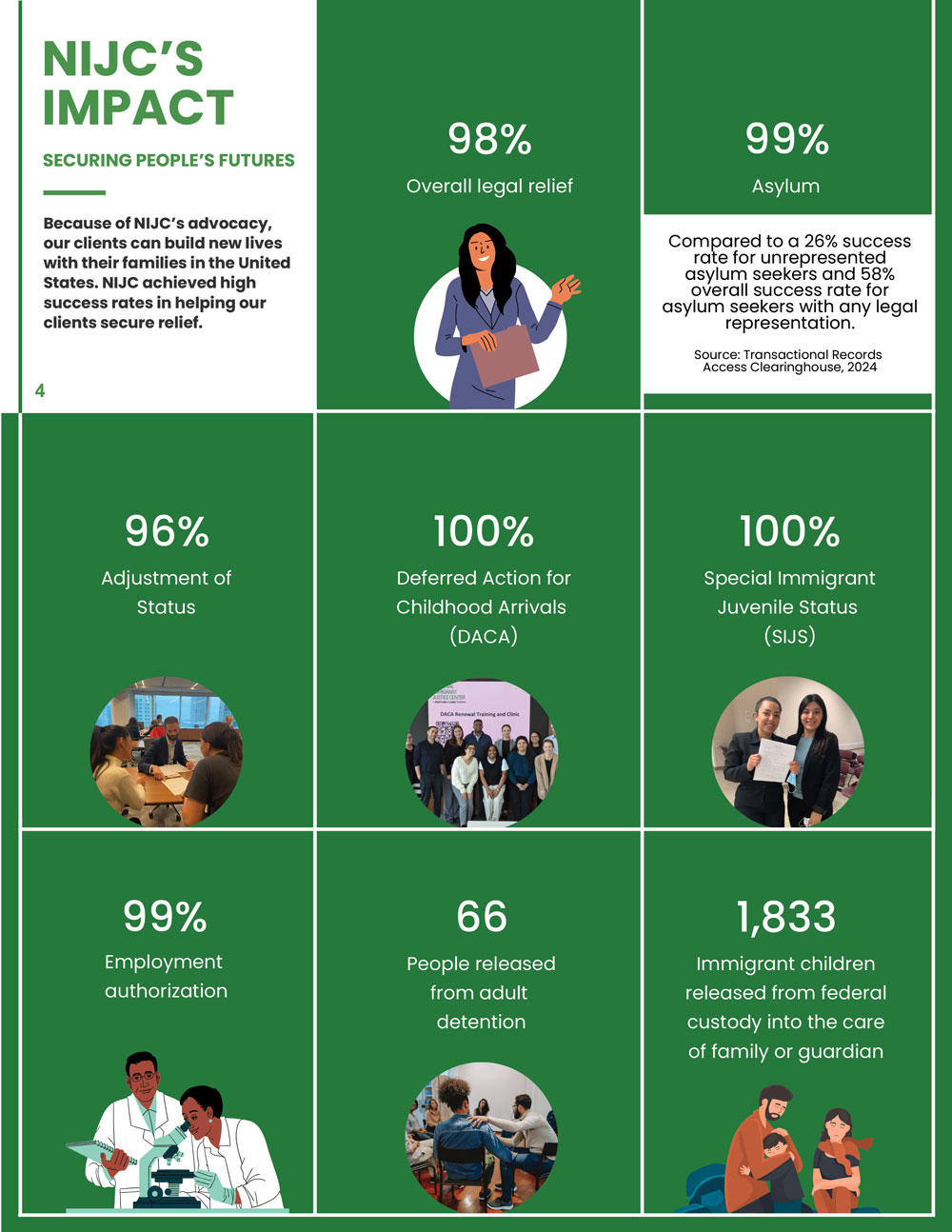
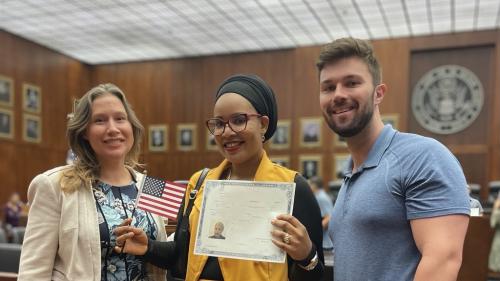
Impact Highlight: Karima's Story
Karima’s father came to the United States to seek asylum after he was repeatedly targeted and harmed in their home country of Rwanda for not cooperating with the government. While her father worked through the asylum process, Karima and the rest of the family moved to Uganda for safety. Once her father was granted asylum in 2014, NIJC represented him in his petition to reunite with Karima and her siblings. Four years later, Karima arrived in Chicago and began working as a housekeeper at a Chicago hotel. She remembers the move as tough but exciting, especially during her first winter.
After six years of living in Chicago as asylees and then lawful permanent residents, Karima’s family attended NIJC’s naturalization clinic, hosted by pro bono partner, Accenture, to start the process of becoming U.S. citizens. In May 2024, Karima’s younger sister was sworn in as a U.S. citizen, and Karima’s own naturalization interview and oath followed soon after. NIJC’s deep legal expertise and pro bono partnerships have allowed thousands of families like Karima’s to achieve safety, family unity, and hope for the future.
Impact Highlight: Defending Human Rights
NIJC’s hallmark is our multi-faceted model. We advocate for the rights of immigrants, asylum seekers, and refugees through our legal services, impact litigation in the federal courts, policy advocacy, and public education about immigrant rights. This year, NIJC defended the right to asylum, challenged unjust enforcement and detention practices, and upheld family unity. Here are some highlights:
Securing Compensation for Families Separated at the Border
NIJC and our pro bono partners (Arnold & Porter Kaye Scholer LLP; Kairys, Rudovsky, Messing, Feinberg & Lin LLP; and the American Immigration Council) achieved a landmark settlement in a case on behalf of five families (including some children as young as five) separated under the prior administration. In this case, the families alleged that, in an effort to deter other asylum seekers from seeking protection, the U.S. government intentionally inflicted profound trauma on them, resulting in potentially lifelong repercussions. This year, we secured a settlement following several years of negotiations with the government. Each family will receive significant monetary compensation for the trauma and harm they experienced. This settlement not only holds the government accountable for some of its most inhumane border policies, but also establishes a binding agreement that will significantly limit the conditions under which immigration officials can separate families apprehended at the border for the next six years.
Combatting Human Rights Violations in Detention
NIJC advanced a novel legal theory in a case in the Southern District of Indiana seeking to close Immigration and Customs Enforcement (ICE) detention facilities with longstanding records of human rights violations. NIJC and pro bono partner, Sidley Austin LLP, challenged ICE and Clay County, Indiana, officials for profiting illegally from the detention of immigrants. The suit contends that ICE ignored blatant violations of federal detention standards and allowed Clay County to misuse federal funds. It seeks to prevent ICE from using federal funds for detention at the jail and to halt states and counties from relying on immigrant detention as a profit-making venture. This case highlights NIJC’s continued commitment to pursue justice for immigrants and hold ICE accountable for its systemic human rights violation against people in its custody.
Defending the Right to Asylum
In June 2024, the Biden administration issued a new rule that greatly restricts asylum eligibility for most people arriving at the U.S.-Mexico border. In response, NIJC, alongside other immigrant rights organizations, filed a lawsuit arguing that the rule constitutes a blatant disregard for the U.S. government’s legal obligations to ensure access to protection for refugees. It also mirrors the 2018 Trump administration asylum ban that had already been ruled unlawful. Additionally, NIJC led efforts with other humanitarian organizations to document human rights violations at the border after the rule was implemented. The resulting report included stories from over 30 asylum seekers who had sought asylum at the border and encountered a range of due process violations under the new ban.
Advocating for the Return of Unjustly Deported Immigrants
NIJC’s Chance to Come Home Campaign calls on the federal government to create a central process to allow unjustly deported people a meaningful chance to return to the United States and reunite with their loved ones. This campaign, led in partnership with 10 courageous individuals fighting to return home, humanizes the harms of deportation and has gained the support of more than 60 members of Congress and numerous civil society organizations. As a result, Senator Cory Booker (NJ) and Representatives David Trone (MY), Adriano Espaillat (NY), and Emanuel Cleaver (MO) introduced a bicameral congressional resolution based on NIJC’s policy proposals. Since the start of the campaign, we have celebrated the return of six deported advocates, including Issa Sao, who was separated from his U.S. citizen wife and two children when he was deported to Mauritania in 2018 as part of the prior administration’s concerted effort to deport African immigrants. After four years apart, Issa reunited with his family because of the campaign’s legal advocacy.
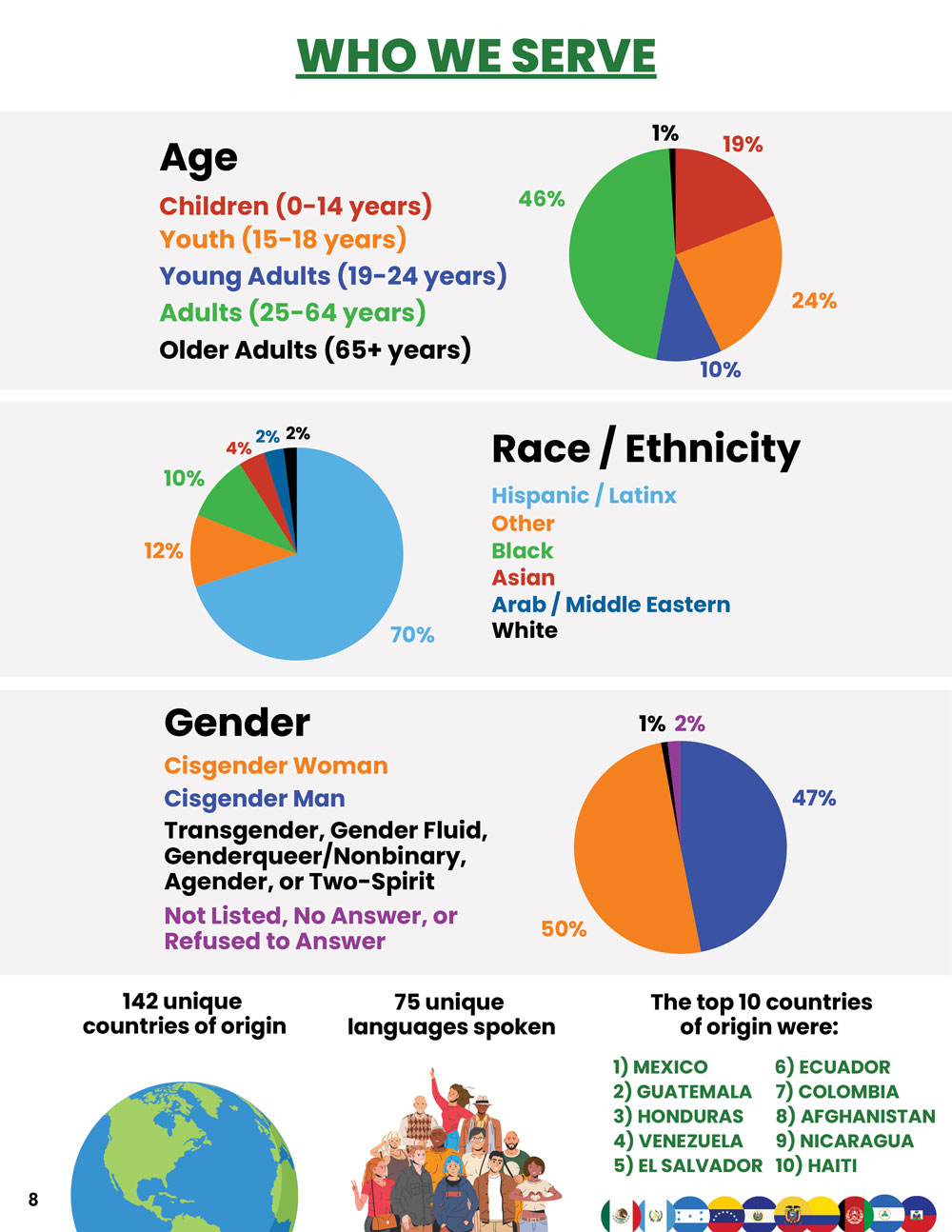
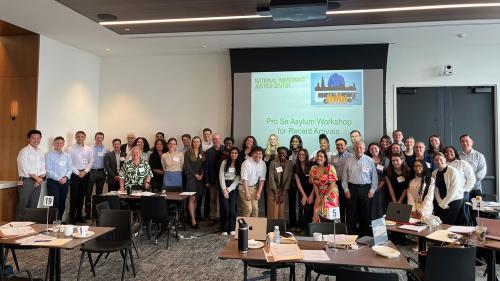
Impact Highlight: Welcoming Newly Arrived Migrants to Chicago
Since August 2022, Chicago has welcomed more than 46,000 recent arrivals from the southern border. In response, NIJC has provided legal information, screenings, and representation to nearly 1,500 recently arrived migrants in the past year. We have created new service models to meet the increased demand and provide legal services at a higher volume. These innovative solutions include:
- Working with pro bono partners to hold 13 clinics to help asylum seekers and their families file applications for relief.
- Providing 5 change of venue clinics to help people move their cases to the court closest to where they live, filing 100 applications.
- Expanding services through NIJC’s Immigration Court Helpdesk, which provides legal information and self-help workshops to unrepresented immigrants.
- Offering one-on-one legal consultations for recently arrived migrants whose cases were placed on a special expedited docket.
- Providing full representation in 150 new cases.
- Collaborating with and training partner organizations to ensure a comprehensive legal response for Chicago’s migrant communities.
NIJC remains committed to welcoming new arrivals to Chicago and ensuring that they have access to legal services and understand their rights and options under the law.
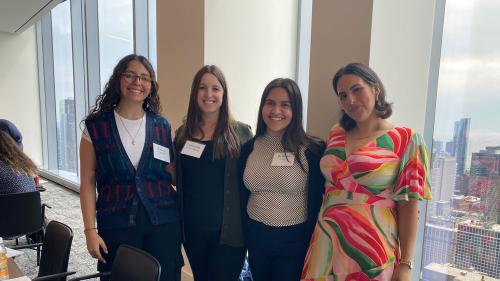
NIJC's Pro Bono Partnerships
Access to an attorney is life-changing. Immigrants in deportation proceedings do not have a right to court-appointed counsel, yet research shows that people who are represented by an attorney are up to 10 times more likely to be allowed to remain in the United States than people without lawyers (Eagly & Shafer, 2016). In addition to our expert in-house legal staff, NIJC collaborates with a network of pro bono volunteers to maximize our impact.
NIJC pro bono volunteers made a difference this year:
- Number of pro bono hours donated: 65,000+
- Number of pro bono volunteers: 2,394
- Number of cases supported by pro bono attorneys: 2,091
- Number of clinics hosted by NIJC and pro bono partners: 44
- Number of trainings NIJC provided to pro bono attorneys: 56

This was one of the most rewarding experiences I have had as an attorney … the stakes could not have been higher. I have never been so happy to hear the client’s DACA application was approved after responding to the Request for Evidence. In the day-to-day of practicing business litigation, this made me feel that I was able to make a difference in someone's life.”
- Mark Makoski, Dykema
